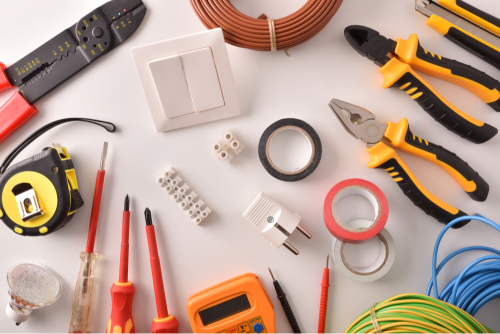Building or reconstructing a house involves making important decisions about electrical systems. Choosing the right electrical materials not only ensures safety and efficiency but also increases the lifespan of your home’s electrical system. Whether you are working on a new build or upgrading an existing property, using high-quality electrical materials is essential to prevent potential hazards and costly repairs in the future. In this blog, we will explore the best electrical materials to use, offer practical tips, and explain how 24/7 Best Emergency Services can help with any urgent electrical issues.
Why Quality Electrical Materials Matter
Electrical systems are the backbone of any modern home. Faulty wiring, poor-quality outlets, or substandard circuit breakers can lead to serious problems, including power outages, short circuits, and even electrical fires. High-quality materials enhance the overall safety, efficiency, and longevity of your electrical system.
Best Electrical Materials to Use
Here’s a list of essential electrical materials to use when building or reconstructing a house:
1. Copper Wiring
- Why it’s the best: Copper is a highly conductive material, which makes it ideal for carrying electricity efficiently. It’s also resistant to heat and corrosion, reducing the risk of electrical failure.
- Tip: Avoid using aluminum wiring as it’s more prone to corrosion and expansion, which can cause loose connections and overheating.
2. PVC or Metal Conduits
- Why it’s the best: Conduits protect electrical wiring from moisture, physical damage, and chemical exposure. PVC conduits are ideal for damp areas, while metal conduits offer better protection in high-traffic areas.
- Tip: Make sure to secure conduits properly to prevent movement and wear over time.
3. Circuit Breakers and Fuse Boxes
- Why it’s the best: High-quality circuit breakers prevent overloads and short circuits by cutting off power when necessary.
- Tip: Install a modern circuit breaker panel with sufficient capacity to handle future upgrades or additional electrical loads.
4. Ground Fault Circuit Interrupters (GFCI) and Arc Fault Circuit Interrupters (AFCI)
- Why they’re the best: GFCIs prevent electrical shock by cutting off power when a ground fault occurs, while AFCIs protect against electrical fires caused by arcing.
- Tip: Install GFCIs in kitchens, bathrooms, and outdoor areas, and AFCIs in bedrooms and living areas.
5. LED Lighting Fixtures
- Why they’re the best: LED lights are energy-efficient, long-lasting, and generate less heat compared to traditional incandescent bulbs.
- Tip: Use dimmable LED fixtures to create flexible lighting options in living areas and bedrooms.
6. High-Quality Electrical Outlets and Switches
- Why they’re the best: Premium outlets and switches reduce the risk of loose connections, which can lead to overheating.
- Tip: Use tamper-resistant outlets in homes with children for added safety.
Tips for a Safe and Efficient Electrical System
Hire a Licensed Electrician – A professional electrician will ensure that all wiring and materials meet local building codes and safety standards.
Label the Circuit Breaker Panel – Clearly label each circuit to make it easier to identify and address issues.
Plan for Future Expansion – Install extra conduits and capacity in your breaker panel to accommodate future electrical upgrades.
Test Regularly – Regularly test GFCIs and AFCIs to ensure they are functioning properly.
Why 24/7 Best Emergency Services Are Essential
Electrical problems can happen at any time — and when they do, quick action is critical. That’s why 24/7 Best Emergency Services are a valuable resource. Whether you have a sudden power outage, sparking outlets, or a malfunctioning circuit breaker, professional emergency electricians are available day or night to fix the issue quickly and safely. Don’t take chances with electrical emergencies — call a trusted professional immediately.
